 Campus
Campus
Please use the menu tabs below to navigate through the different sections of this edition where we have collated all the information relevant to the 2019 edition, from the logistics to all the Sessions documents (including the list of speakers and supporting documents).
Should you have any questions, don't hesitate to contact us.
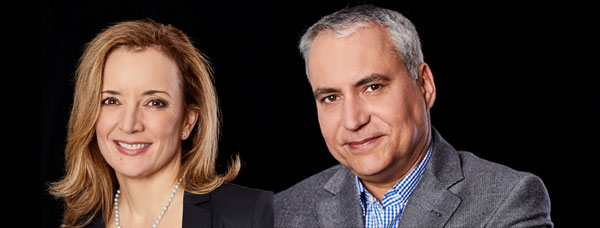
Dear esteemed colleagues, equestrian professionals and enthusiasts,
Welcome to the FEI Sports Forum 2019 platform!
Since 2012, we have gathered annually to discuss, debate and plan the future of equestrian sport and, by doing so, effectively ensure that, as a community and as an industry, we stand together and we drive the sport together.
That time of year has come once again, and we are delighted to present you with the 2019 programme which has been carefully crafted in response to some of the challenges and questions we are facing as a sport. And it’s not always just about equestrian sport, but also the challenges the entire sporting industry is facing and even more generally, how can we be leaders in our domain and improve our performance, our integrity and our reliability as an institution of value and worth.
The first topic we will cover this year at the Sports Forum is very much one of those questions; gender equality. Even though equestrian is the only Olympic sport in which men and women compete on equal terms at all levels within the arena, we still have a lot to prove when it comes to representation in governance-related positions (Committees, NFs, etc.). We realise it is important to have policies and processes which can help shift the status quo, so how can/should we do this in our sport and in our governing bodies and representative committees?This session will be followed by an important session on preparations for the Tokyo 2020 Olympic and Paralympic Games, including a progress report, climate mitigation plans and a presentation on optimising equine and human performance in a challenging climate. Horse welfare is at the forefront of all our endeavours and climate is a crucial question in the build up to Tokyo 2020.
The rest of the day will be dedicated to a review of the FEI’s legal system, including a proposed way forward regarding pony measurement, as well as sanctions and measures related to Eventing Risk Management. The closing session of the day will be on Reining, allowing for discussion on the future of the discipline.
The Sports Forum’s second day, Tuesday 16 April, will focus on Endurance. It is the first time that an entire Sports Forum day will be dedicated to a single topic, but in view of the turmoil in which the discipline has found itself in recent times, it is vital we take the time to reflect on the future in an open and responsive manner. The Endurance Temporary Committee will present an update on their work to date and will seek the participants’ feedback on their proposals and the way forward.
The FEI Sports Forum programme is a reflection of where we stand but importantly where we need to go and we are looking forward to your active participation and your precious input on all the topics for the 2019 FEI Sports Forum.
You will find all the information you need here on this platform including the detailed timetable, information on each of the sessions, key deadlines, contact information, travel, accommodation and fees for registration, which this year also includes a reduced rate for younger delegates (U25) in order to encourage as many young athletes and equestrian professionals to join us for these important discussions on our collective future. We will also be live streaming the FEI Sports Forum, so for those unable to join us here in Lausanne, we hope you will follow the discussions online. This is a live platform so we will be updating this regularly with additional information as it becomes available.
We look forward to seeing you in Lausanne (or online) for the eighth edition of the FEI Sports Forum!
Ingmar De Vos, FEI President & Sabrina Ibáñez, FEI Secretary General
| Last update: 1 November 2019 | ||
| Day 1 | IMD, M100 Auditorium | |
| Monday | 15 April 2019 | |
| 08:15 | Registration opens - Welcome Coffee | |
| 09:00 | Opening by the FEI President followed by a presentation from IMD representative | |
| 09:30 | Session 1: Gender Equality | |
| 10:30 | Coffee break presented by SAP | |
|
11:00 |
Session 2: Tokyo 2020 Olympic and Paralympic Games |
|
| 12:30 | Lunch - IMD Restaurant | |
|
14:30 |
Session 3: Review of Legal System |
|
| 16:30 | Coffee break presented by SAP | |
| 17:00 | Session 4: Future of Reining | |
| 18:00 | END | |
| 19:30 | FEI Official Dinner - Hotel Royal Savoy - Dress code: Business attire | |
| Day 2: Reshaping Endurance | IMD, M100 Auditorium | |
| Tuesday | 16 April 2019 | |
| 08:30 | Registration opens - Welcome Coffee | |
| 09:00 | Opening and Session 5: Qualification of Horses and Athletes: reducing welfare risks | |
| 11:00 | Coffee break presented by IRIS | |
| 11:30 | Session 6: Educating Officials and correct application of the rules | |
| 13:00 | Lunch - IMD Restaurant | |
| 14:00 | Session 7: Improvements and innovations to reshape Endurance | |
| 15:30 | Coffee break presented by IRIS | |
| 16:00 | Session 8: Wrap-up by the Secretary General and open Q&A | |
| 18:00 | END | |
| 18:30 | FAREWELL COCKTAIL at the FEI Headquarters, HM King Hussein I Building - Dress code: Smart Casual | |
| Lunches & Dinners | ||
| Monday 15 April | ||
|
Lunches will be served either in the Foyer or at the Restaurant of IMD. The Official Dinner will be held at the Hotel Royal Savoy from 19:30. The Royal Savoy is located just in front of the FEI Headquarters. |
||
| Tuesday 16 April | ||
|
Traditionally, the Farewell Cocktail Dinner will take place at the FEI Headquarters, HM King Hussein I Building from 18:30 to 22:00. |
||
All documentation (list of speakers, supporting documents, presentations and any additional documents) from the various sessions is published and accessible in the corresponding tabs below.
Session breakdown:
FEI President Ingmar de Vos opened the eighth FEI Sports Forum with a rallying address focusing on some of the topics which will be explored, debated and unravelled over the coming 48 hours and calling on delegates and stakeholders to share their feedback and their insights.
Held at the IMD Business School in Lausanne (SUI) for the seventh year in a row, the FEI Sports Forum 2019 has attracted 265 delegates with a diverse programme covering gender equality, Tokyo 2020 preparations and climate mitigation, review of the FEI legal system, the future of Reining and the entire second day dedicated to Endurance. The FEI President set the scene for the Endurance discussions on day two reminding delegates why tackling and resolving the issues which have negatively impacted the sport for so many years is crucial. And he was uncompromising in his message:
“Endurance is and will continue to be an FEI discipline. Not only because we are the sole governing body, and as such we need to take our responsibilities, but also because it has great potential and a big future in the FEI, but not as it currently exists. This is a ride – not a race. Horsemanship and the unique bond between horse and rider is key. If you don’t respect these values then go somewhere else. In our sport athletes and their entourage also have to take responsibility. This will take courage and leadership.”
| Opening Speeches 15 April 2019, 09:00 - 09:30 |
||
The FEI President reminded delegates that the FEI Sports Forum had become an integral part of the FEI governance process and every year the discussions and outcomes of the sessions had gone on to influence the proposals and decisions made at the FEI General Assembly. This was their opportunity to make their voices be heard and to play a role in the future of equestrian sport.
“As you have seen in the programme, we have again a busy two days, with diverse topics and an impressive list of experts, guest speakers and panellists to help guide our discussions. But the Sports Forum is all about dialogue, so your input is absolutely vital and I want to take this opportunity already to thank everyone here for making the effort to come to Lausanne, and invite you to actively participate in the discussions.”
Following the opening address by the FEI President, IMD representative Professor Ginka Toegel, an IMD teacher, facilitator and researcher in the areas of leadership and human behaviour, set the scene for the first session of the day: gender equality. She gave a thought provoking introduction on the concept of gender bias, and how perception affects our behaviour.
In an interactive presentation, she referred to several studies which clearly demonstrated gender bias and our “automatic” response to situations which tends to be based on emotional and learned behaviour rather than rationale and logic. The key was not to tell people what to think or what to do, but to encourage people to make inclusive decisions through “nudges” to guide our brain to make the right decision.
She concluded with the small steps everyone can take in their daily lives when it comes to introducing “nudges” and reflecting on why and how we ask gender biased questions, therefore acknowledging gender bias so that we can overcome it and make the right decisions for the right reasons.
|
Opening Session Library |
||
| Presentation by IMD Professor Ginka Toegel | ||
| Speakers bios |
The first session of the day was moderated by FEI President Ingmar De Vos with a specific focus on gender equality from a governance perspective and in the work place. Even though equestrian is the only Olympic and Paralympic sport in which men and women compete on equal terms at all levels, female representation in governance-related positions (Committees, NFs, etc.) can be improved.
The panel was made up of:
Caitlin Kraft-Buchanan (Founder/Executive Director Woman@The Table, Co-Founder International Gender Champions).
Sabrina Ibáñez (FEI Secretary General, President APSO, IOC Gender Equality Working Group, Mentor Champion of the New Leaders Sport Leadership Programme).
Mohamed Elsarky, Chairman British Equestrian Federation.
Speakers details ![]()
The FEI President opened the session by reminding the delegates about the recent update to the FEI Statutes, Art 2 which came into effect on 1 January 2019:
“The FEI shall encourage and support the promotion of gender equality in sport at all levels and in all structures with a view to implementing the principle of equality of men and women”.
He went on to explain that this shift and this session was part of a bigger process in the sports world to address gender equality at the decision making level and to actively encourage gender equality at all levels of the sport both on and off the field. He reiterated that National Federations have an important role to play within their own governance structures but also through the candidates they nominate for FEI Committees.
Each of the panellists then went on to present their insights and recommendations - see summaries below. You will also find links to relevant supporting documents (presentations) below.
| Session 1: Gender Equality 15 April 2019, 09:30 - 10:30 |
||
Caitlyn Kraft-Buchanan, Founder/Executive Director of Woman@The Table and Co-Founder of the International Gender Champions Network gave some background as to how she got involved in the gender equality movement and the purpose of these different initiatives. She went on to explain and provide examples of situations where gender diversity in the workplace and within teams had borne fruits providing a robustness to the decision making process thanks to the diversity and range of perspectives. She referred to the terms “hacks”, and how gender equality could be achieved through “hacks to the system” which basically entailed small changes to existing structures which allow and encourage gender equality.
“Diversity brings you a perspective that brings strength.”
Sabrina Ibáñez, FEI Secretary General, President APSO and member of the IOC Gender Equality Working Group shared relevant gender equality statistics from the international equestrian sports scene showing that on many fronts, the sport is a leader in this domain, but nevertheless, when it comes to governance there were big improvements to be made but this was not uncommon in the sports world.
“NOC’S, IF’s all struggle with gender equality on boards and committees. IF’s with gender equality on boards have 70% higher success rate.”
- Download the equestrian statistics here: Gender Equality Statistics.
- Additional statistic: There are 265 delegates at the FEI Sports Forum 2019 (44% women; 56% men)
Mohamed Elsarky, Chairman of the British Equestrian Federation talked about the Diversity Action Plan which was launched in 2017 and the progress the British Federation and all their members had made following the establishment of clear objectives and targets. He emphasised how important it was to have a clear line of sight with strong leadership to drive change and overcome the gender bias which affects workplaces. He reiterated the need for communication, collaboration and shared goals with a common mind-set about the aims and objectives.
The first question from the floor came from Danish Equestrian Federation President Ulf Helgstrand: “Since when is gender more important that competence?
To which Caitlin responded: “Never, it is always competence first.
There are many qualified women who don’t get the opportunity because the system is against them we need to address the imbalance in the right way.”
Caitlyn concluded with a question to the audience asking them to think about what are the structural impediments to gender equality in their organisations and what structural hacks or tools could be implemented to balance the playing field?
|
Session 1 Library |
||
Tim Hadaway, FEI Director of Games Operations, opened the day’s second session focused on the Tokyo 2020 Olympic and Paralympic Games with an update on construction work at the two equestrian venues, Baji Koen and Sea Forest, and plans for the Ready Steady Tokyo test event (12-14 August 2019). He also talked about the potential challenges posed by climatic conditions in Tokyo, including analysis of historical weather data combined with data collected at the venues over the past two years, as well as an outline of what mitigation measures are already in place and what is being planned.
FEI climate specialist Dr David Marlin and Chair of the FEI Medical Committee Dr Peter Whitehead spoke in greater detail on ways to prevent potential heat-related issues and how to optimise performance in the equine and human athlete, as well as how these measures will also be useful for officials and spectators.
Following British veterinarian Dr Rachel Murray’s brief on optimal warm-up techniques, Chair of the FEI Eventing Committee David O’Connor provided an insight into how Eventing is constantly fine-tuning its approach to competition in challenging climates. FEI Veterinary Chair Dr Jenny Hall advised delegates on what additional measures would be in place to ensure horse welfare and the study that would be made at the test event, and this was followed by a panel discussion involving representatives from each of the disciplines: Kyra Kyrklund (FIN) for Dressage, Göran "Yogi" Breisner (SWE), Henrik Ankarcrona (SWE) for Jumping and Joyce Heuitink (NED) for Para Dressage.
| Session 2: Tokyo 2020 Olympic and Paralympic Games 15 April 2019, 11:00 - 12:30 |
||
Following a whirlwind visual tour of the Tokyo 2020 equestrian sites, Tim Hadaway spoke about the creation of the FEI Climate Mitigation Working Group and the work being done with the individual discipline committees on potential additional mitigation measures. He spoke about the air-conditioned stables, multiple cooling facilities and mobile cooling units that will be provided by the Tokyo 2020 Organising Committee, as well as competition scheduling for early morning and evening sessions. The national weather agency will also provide very specific venue weather predictions and reports, delivering on-venue monitoring and advice on an hourly basis. Delegates were reminded of the National Federation advisory document available on Inside.FEI.org/Tokyo 2020.
Dr David Marlin talked about the ongoing FEI research programme that has been in place since the Barcelona 1992 Olympic and Paralympic Games, with new cooling protocols introduced for Atlanta 1996. Trigger points for when mitigation processes need to be implemented based on the Wet Bulb Globe Temperature (WBGT) are constantly being refined. Talking about the preparations for Tokyo 2020, he said: “I believe that this is the best the horse world has ever been prepared for the Olympic Games”.
A key message reiterated by all speakers was that thermal stress is likely to result in reduced performance. The effects of heat and humidity are cumulative, both on horses and on all humans. “If teams don’t prepare properly then horses and riders may suffer in their performance, but we want to stop them getting to the point where their health and welfare is compromised”, David Marlin said.
Dr Rachel Murray, veterinarian and scientist at the Animal Health Trust, spoke about the threshold of intensity versus performance and how increased intensity during warm-up in a challenging climate can result in decreased performance.
As body temperature increases more rapidly in hot climates, Dr Murray recommended a reduced duration and intensity of training/warm-up, splitting up the session into 3 x 15 minutes versus 45 minute, interspersed with cooling and rehydration. She stressed that cooling in the warm-up does not mean the horse’s muscles will become cold. She also recommended rest periods in shade and pre-cooling prior to exercise, in addition to ongoing monitoring and assessment of the horse.
David O’Connor, Chair of the FEI Eventing Committee, spoke about the lessons learned before and since Atlanta, “the hottest Olympic Games we’ve had”. He urged National Federations to get the message back to their trainers and the athletes about the importance of preparation and understanding cooling techniques, particularly pre-cooling, which a lot of countries would not be used to.
He also stressed the importance of hydration. “If you’re thirsty you’re already late, you’re already behind your hydration pattern. The problem is with horses they don’t drink until they’re thirsty and so physically they’re always behind the curve. It is very important to monitor hydration. You can tell an athlete to rehydrate . . . but you can’t tell a horse that.”
Dr Jenny Hall spoke about a new concept, individual horse intervention, a formal protocol for support during post-travel recovery and training, which will be in place for Tokyo. This collaborative process, working with the horse’s own team, will provide the ultimate protection of horse and athlete health and welfare, with horses at exercise always being monitored.
There will be agreed triggers for intervention, which will include excessive sweating, increased respiration and general demeanour. Any required intervention, which will include moving a horse into shade to record the rectal temperature, heart rate and respiration and cooling if indicated, will be used to gather objective data. She also referenced best practice in relation to cooling, and the awareness and education programme that is already in place and which will be ramped up over the coming months.
Dr Peter Whitehead presented on optimising human performance in thermally challenging climates, but emphasised that it wasn’t just the athletes who could be affected by heat and humidity, but also the workforce. Acclimatisation applies to us all, both humans and horses, he stressed. “We’re all mammals and the principles are very similar.”
Health before travel is important, fitness and hydration are paramount, and this applies to everyone, not just to athletes. Dressing appropriately for the heat, maintaining hydration, eating well and sleeping in air conditioned rooms are also key.
The four discipline trainers also supported the need for awareness and working with athletes and their entourage from now on in their preparations for the Olympic and Paralympic Games. And also the importance of monitoring. “It’s very important in the build-up, not just the last few weeks but right through, to get to know your horse as an individual, what is normal”, Yogi Breisner said. “Get the benchmark on your horses of what’s normal because if you know what’s normal then you can monitor the abnormalities.”
| Session 2 Library | ||
|
Presentations by |
- Tim Hadaway, FEI Director of Games Operations - Dr David Marlin, FEI climate specialist : Part 1 & Part 2 - Rachel Murray, British Veterinarian |
|
The opening afternoon session was dedicated to a review of the FEI’s legal system (Chapter VIII of the FEI General Regulations), including proposals for revised areas of responsibilities for Ground Juries, the role of the Appeal Committee, a possible FEI HQ administrative disciplinary process, the start date of suspensions, sanctions and measures related to Eventing Risk Management and a proposed way forward regarding pony measuring.
The proposed legal changes were presented by FEI Legal Director Mikael Rentsch and Deputy Legal Director Áine Power, with the proposals being debated by delegates and a panel of experts – Swedish Jumping chef d’equipe Henrik Ankarcrona, Italian Chef de Mission Andrea White, Australian Eventing athlete Paul Tapner, and Chair of the FEI Jumping Committee Stephan Ellenbruch. Chair of the FEI Eventing Committee David O’Connor spoke about sanctions related to Eventing Risk Management.
The proposed way forward for pony measuring, which was presented by FEI Veterinary Director Dr Göran Akerström, generated lively discussion amongst delegates and the panelists, Peter Bollen (BEL), President of the International Equestrian Organisers Alliance, Lucy Allen (IRL), a member of the FEI Jumping Youth Development Working Group.
| Session 3: Review of the Legal System 15 April 2019, 14:00 - 16:30 |
Review of the legal system
FEI Legal Director Mikael Rentsch and Deputy Legal Director Áine Power led discussions on the review of the Legal System. The review is aimed at creating a more user-friendly legal structure that is clear, cost effective and results in efficient decisions being taken by the appropriate sanctioning body each time.
A proposal to change the current legal powers and responsibilities of Officials and other appointed bodies during events was put forward for discussion. Delegates debated the proposal that the Appeal Committee could be removed and all onsite matters dealt with by the Ground Jury. The new system would still allow for athletes to have the right to be heard and decisions to be appealed to the FEI Tribunal post-event.
Other proposals put forward for consideration were:
Panelists and delegates also discussed whether there is a need to update the video evidence rule, which has been in place since 2012, particularly whether smart phone video content should be admissible as evidence. Currently only official video recordings made by a broadcast network or a video company hired by the Organising Committee can be used in a protest.
Eventing risk management sanctions
David O’Connor presented a new proposal to the Eventing Rules on sanctions related to Risk Management. Under current rules, two recorded warnings lead to a yellow warning card, while two yellow warning cards for the same offence within one year, lead to a four month suspension.
The following changes were proposed:
The proposed changes would also allow the FEI to designate a later start date for the suspension if the period runs into the Eventing off-season and has no real impact on the athlete. This topic debated lively debate, with opposing opinions voiced.
Pony measuring
A proposal for a new system of pony measurement would mean that ponies will no longer be measured at events but at measuring sessions conducted at FEI Certified Measurement Stations, in each country or region, from 1 January to 15 March each year, with an option for other sessions after this period. Only FEI appointed Veterinarians can carry out measuring.
The measurement result will be included on the pony’s profile in the FEI database and a Measurement Certificate will be issued by the FEI. Only ponies will an FEI Measurement Certificate will be allowed to enter FEI pony competitions.
Lifetime certificates would be issued by the FEI to ponies that are eight years and older. Ponies younger than eight years will be required to be measured every year to be eligible for an FEI competition.
If the proposal is accepted by National Federations, the transition period in which newly registered ponies would go through the new system, would begin on 1 January 2020 and end on 1 January 2023. During this period the FEI would carry out measuring only at three events: the European Pony Championships, the Nations Cup Final, and the Pony Trophy Final, but with the possibility of measuring at other events if deemed necessary. Following the transition period, all ponies would be required to go through the new system.
| Session 3 Library | |
|
Presentations: |
Review of Legal System by Áine Power, Deputy Legal Director Eventing Risk Management sanctions by David O'Connor, Chair of FEI Eventing Committee Pony Measurement by the Panel (Peter Bollen, Lucy Allen and Göran Akerström |
|
Supporting Documents: |
|
Francisco Lima, FEI Director Governance & Institutional Affairs, introduced the final session of the day on the Future of Reining. He focused on the unique challenges created by the existence of two international governing bodies, highlighting that it is against the FEI Statutes which require the FEI to be the sole authority for each of its disciplines.
The session provided an overview of its history from when it first came under the FEI umbrella in 2000 to now, and the future of the sport internationally.
Bettina de Rham, the FEI Director who includes Reining in her remit, outlined the evolution of the discipline, highlighting the need for its associated affiliates NRHA and AQHA to fully comply with the FEI General Regulations, FEI Statutes, FEI Veterinary Regulations and how the sports specific rules were amended in different steps to comply accordingly. The competition formats were revised, to recognize sporting achievement and the rules on stewarding and respect of Horse welfare were strongly reinforced.
Sven Friesecke (SUI), Chair of the FEI Reining Committee and head of Reining at the Fédération Suisse des Sports Equestres (FSSE), spoke about the potential for a three-year and five-year plan for FEI Reining and achieving compliance with the FEI rules and policies by all external parties.
Here are some of the key takeaways below…
| Session 4: Future of Reining 15 April 2019, 17:00 - 18:30 |
||
Francisco Lima opened the session explaining the importance of FEI Reining and that whatever decision is taken following these open discussions and the ongoing consultation process, the integrity of the discipline must be ensured and a level playing field must be maintained for all athletes. He reminded delegates of the breaches of the cooperation agreement with NRHA/AQHA which had resulted in its termination last November and emphasised that if there were to be any future cooperation, the FEI rules regarding anti-doping, horse welfare and stewarding would have to be fully respected.
Bettina De Rham went on to explain in further detail the extensive review of the existing structure of FEI Reining from the sports perspective and the measures put in place since 2009 which have assisted in the management and development of the sport. Despite these continued efforts to encourage the growth of FEI Reining and the overall increase in the number of Events, Reining is the only discipline with a decrease in the number of registered athletes over the past decade.
Sven Friesecke talked about the significance of working on a well thought out plan with the potential to change FEI Reining, based on a three to five-year plan which would include promotion of 1 and 2* competitions, a U25 category and a youth Nations Cup series.
“The youth and young riders are our future. We have to build on them and it really is our plan to build up the system for these grassroots riders.”
He stressed the need for taking the time to work towards a possible new cooperation agreement and called for a clear commitment from the Reining community to FEI Reining. This was strongly supported by the European Equestrian Federation (EEF) and individual European National Federations, as well as USA Reining representative Rick Weaver.
“I want to congratulate the FEI for taking on this very important topic and for having the courage to take this on”, Rick Weaver said. “So now we have an opportunity to use the National Federations and to go ahead and to build a business plan that will create a pathway for us to recruit and retain FEI members.”
FEI President Ingmar De Vos, who earlier in the day had stressed that no decisions had been made and that the discussions were all part of the consultation process, highlighted the importance of the governance aspects. “We are just putting the situation here in very objective way to this audience and I have a lot of sympathy for all that has been said.
“Maybe we don’t like to talk a lot about legal affairs and rules and statutes but they are really a fundamental basis of our organisation. We need to respect these statutes . . . and to try to find an agreement with these other international governing bodies which is much more successful than the FEI in Reining to find a solution for us to be able to respect our statutes, in other words to be the sole governing body.”
The FEI Secretary General Sabrina Ibáñez wrapped up the day’s proceedings by telling delegates that all the discussions on Reining will be taken into consideration by the FEI Board. “Regarding Reining, we need a recommendation from you to take forward to the General Assembly in November”, she said.
| SESSION 4 LIBRARY | ||
|
Presentations: |
||
|
Supporting Documents: |
||
The opening session of day two, which is dedicated solely to Endurance, focused on the qualification of athletes, both human and equine, with the goal of reducing welfare risks.
Prior to the presentations detailing recommendations for potential rule changes put forward by the Endurance Temporary Committee, FEI Secretary General Sabrina Ibáñez set the scene with a review of the discipline and the problems that have affected the sport over the past number of years.
“In order to address these issues, the FEI Board set up the Endurance Temporary Committee”, she said. “These courageous persons seated in front of you today have spent a huge amount of their personal time to accomplish their mission. They have minutely assessed the issues affecting the sport. They have reached out to and listened to our community and, with that feedback in mind, they have carried out an in-depth review of the rules which will hopefully bring the sport back to where it should be: riding versus racing with horse welfare and horsemanship at its core.”
| Session 5: Endurance - Qualification of Horses and Athletes: reducing welfare risks 16 April 2019, 09:00 - 11:00 |
||
Endurance Temporary Committee member Tarek Taher, Endurance representative on the FEI Athletes’ Committee and founder of True Endurance International Riders Association (TEIRA), spoke passionately about his love of the sport and the importance of feedback from the whole Endurance community.
“Rest assured that your voices are being heard loud and clear, and your horses as well”, he said. “Your concerns and your suggestions have been the basis of everything we do at the Endurance Temporary Committee and the FEI. The communication between the global Endurance community, the ETC and the FEI has been phenomenal. The FEI has been proactive and extremely cooperative.”
Committee Chair Dr Sarah Coombs spoke about the mission of the Committee with the goal of taking the discipline forward based on the true concept of horsemanship. She also spoke about the necessity of changing the ethos within the sport.
“We need a change of ethos”, she said. “We need to test the stamina and fitness of the horse without compromising welfare, which will require good horsemanship, more strategic riding and more emphasis on recovery. Make no mistake about it, Endurance is a competition against the clock, but winning requires completion and without any emphasis on completion you are not going to win.”
The latest findings in the Global Endurance Injuries Study (GEIS) were presented by Professor Timothy Parkin, member of the FEI Veterinary Committee and the Endurance Temporary Committee, who heads up the research programme for the GEIS. Professor Parkin and his team at the University of Glasgow have used the huge range of data collected to show that previous and recent Failed To Qualify (FTQ) classifications and low previous completion rates increased the risk of an FTQ at following rides.
Committee member Valerie Kanavy then provided details of a proposed innovative completion percentage system, based on capped speeds for qualification up through the ranks from CEI 1* to Championships. This pyramid system would allow free speed only for those with a completion rate of 66% or over.
“You ride smart, you take care of your horse, you have successful completions, the faster you can go”, she said. “We’ve brought horsemanship and successful completion percentages back into the qualification process. Ride smart, ride safe, you can get to the top.”
The proposal met with mixed views and resulted in extensive debate amongst delegates and the panel, made up of the full Endurance Temporary Committee and FEI Vice President Mark Samuel, who has been the direct link between the Committee and the FEI Board.
Roly Owers, Chief Executive Officer of the equine welfare charity World Horse Welfare, spoke eloquently about the need for change in the sport.
“I would like to applaud the committee on the work you have done today. What has long been very clear in terms of risk with Endurance is speed. And I think that the proposal today, whilst I am sure it might need some tweaking, you seem to have come up with a very interesting and potentially very viable way of bringing responsible riding in and very much to the fore.
“I think we do have to accept that the situation now is not acceptable . . . when we know that speed is a significant risk we need to take action to limit it whilst maintaining a strong element of competition. So I would encourage everyone to be very open minded and I applaud you for coming up with this suggestion as I believe it will have a huge potential to grow Endurance in the future and not limit it.”
As debate on the new proposal continued, the FEI Secretary General reminded delegates: “this is not a done deal. This is the Forum, we are here to present the ideas. The Endurance Temporary Committee is going to go back, take it all into consideration and start working on the rules.”
In line with the FEI Statutes, the proposed rules changes will go out to National Federations and stakeholders in July as part of the full consultation process before the final rules amendments are put to the vote at the FEI General Assembly in November.
| Session 5 Library | ||
| Presentations: |
Opening speech by FEI Secretary General, Ms Sabrina Ibáñez Qualification of Horses and Athletes: reducing welfare risks presented by the Panel |
|
| Supporting Documents: | ||
The second session, which focused on education and Officials, was opened by FEI Vice President Mark Samuel, who facilitates communication between the Endurance Temporary Committee and the FEI Board. He presented the 15 recommendations of the Officials Working Group and the additional proposals on these recommendations from the Endurance Temporary Committee.
“Please remember the spirit of collegiality here and that we’re all working towards a better future”, he commented. “There is an imperative for change here and we need to not ignore that and we need to work collectively and constructively for positive pragmatic solutions.”
Endurance Temporary Committee member Pieter Wiersinga addressed the topic of integrity and leadership by focusing on the Code of Conduct for FEI Officials and the correct and robust application of the rules. Proposals were centred around the appointment and rotation of officials, improved training, reinforcement of the role of the Independent Governance Advisors (IGA), stronger follow up system for Officials’ reporting to the FEI and tackling corruption.
| Session 6: Endurance - Educating Officials and correct application of the rules 16 April 2019, 11:30 - 13:00 |
||
“I wish you a lot of wisdom because Endurance has a positive future, provided the unacceptable behaviours of a few in the community are addressed and rectified”, Pieter Wiersinga said. “It’s sport practised in a fair way giving access to all, from beginners to the most experienced and talented athletes, and placing the emphasis on the partnership between an educated rider and a well-trained horse.”
FEI Director of Education and Officials, Frank Spadinger explained the principles of the FEI’s new proposed Endurance Education System, which is pending approval. These include the organisation of Officials’ education, career pathways and the criteria for transfer (up and down) and maintenance. The criteria for transfer and maintenance include theoretical and practical assessments and officiating experience.
FEI Endurance and Driving Director Manuel Bandeira de Mello spoke about the appointment of Officials, and the FEI’s support and supervision of these Officials. In future, and in line with existing rules, the appointment of Officials will be done by the FEI in consultation with the Endurance Technical Committee and the Organising Committee. Clear selection criteria based on integrity, competence and English language skills will allow for better officiating performance and a level playing field.
He also spoke about Officials’ reports, with plans for an enhanced reporting system aimed at improving accurate reporting based on a better follow-up system and confidence among Officials.
FEI Legal Director Mikael Rentsch talked about existing sanctions in Equine Anti-Doping and Controlled Medication cases, and also sanctions for horse abuse and under the new Hyposensitivity Control System. The possibility of extending a trainer’s suspension to include all of his/her horses was discussed, with the Legal Director emphasising that the principle of proportionality must be respected in all sanctions.
This session also generated strong debate, with discussions centred on the correct actions of Officials, enhanced stable security, improved measures to recruit young candidates as Officials, particularly veterinarians, and the ongoing and crucial role of Independent Governance Advisors.
| Session 6 Library | ||
|
Presentation: |
||
|
Supporting Documents: |
Supporting document for Day 2 (Session 5-6-7-8) Executive Summary Session 6 - Endurance - Educating Officials and correct application of the rules |
|
Proposed improvements and innovations to reshape Endurance, which form the basis of the Endurance Temporary Committee's proposed rules modifications, were presented during the afternoon’s opening session.
Prior to presenting the Committee’s 16 far-reaching proposals, Chair Dr Sarah Coombs referenced the fact that the Committee is also proposing more effective drug sanctions to include extending suspension on horses and to include owners, stating that there is never an excuse for horse abuse.
“Everyone in this room has to agree that the level of drug abuse is unacceptable”, she said. “For me it is the underlying factor in a lot of the issues that we see and we have to all agree that it has to be stamped out.”
Details of the full 16 proposals put forward by the Endurance Temporary Committee are below, along with supporting documents.
| Session 7: Improvements and innovations to reshape Endurance 16 April 2019, 14:00 - 15:30 |
||
Recommendations of the Endurance Temporary Committee for proposed rule changes:
Professor Timothy Parkin, member of FEI Veterinary Committee and the Endurance Temporary Committee and who heads up the research programme for the FEI’s Global Endurance Injuries Study (GEIS), had earlier presented several parameters based on the GEIS evidence, which provided the scientific basis for the Endurance Temporary Committee’s proposed rule changes.
Data shows that the risk of failure to qualify (FTQ) can be reduced by a number of factors: increased number of rides as a combination, longer out of competition periods, fewer rides in the previous 120 days, and more loops of similar length in a ride. Professor Parkin also advised that a lower heart rate on first presentation decreases the risk of FTQ at the next loop. Statistics show that a heart rate of greater than 64bpm at first presentation, especially during the second half of the ride, increased the risk of FTQ.
FEI Veterinary Director Göran Åkerström had opened the session with a focus on drug abuse, the new hyposensitivity protocol, the Equine Anti-Doping and Controlled Medication strategy for Endurance, post mortem results and injury reporting. The new post mortem protocol now includes forensic investigation which can identify pre-existing bone injury, injection marks and the time of the injection, nerve blocks and the type of substance used. The Veterinary Director also revealed that there are currently three ongoing horse abuse cases in Endurance based on post mortem findings.
Other possible future veterinary actions under the Equine Anti-Doping and Controlled Medication Programme (EADCMP) include hair testing, out of competition testing for banned substances, saliva testing after the vet gate, thermography and detection of nerve blocking agents.
| Session 7 Library | ||
|
Presentation: |
||
|
Supporting Documents: |
Supporting document for Day 2 (Session 5-6-7-8) Executive Summary Session 7 - Endurance - Improvements and innovations to reshape Endurance |
|
The final session of the FEI Sports Forum 2019 was devoted to an extended questions and answers session to allow further debate on the 16 recommendations put forward by the Endurance Temporary Committee.
Topics that were further discussed included out of competition testing, post mortem examinations, education, also on anti-doping, course design, rider weight, rotation of Officials, cancellation of events, dangerous riding and certificates of competency, mandatory out of competition periods, horse and rider combinations as part of the qualification process, data collection for research, staggered starts, heart rates, overnight stabling, e-reports, definition of significant prize money, the role of sponsors, quality control and ongoing monitoring of time keeping systems.
| Session 8: Endurance - Open Q&A and wrap-up by FEI Secretary General 16 April 2019, 16:00 - 18:00 |
||
Joe Mattingley (USA), a member of the former Endurance Strategic Planning Group (ESPG), offered his congratulations for the work that has been done to date. “I truly see this as evolutionary this conversation we’re having today, because it’s building on all the work that’s been done in the past”, he said.
“I believe the ESPG, along with a number of other forums we’ve had since then, and the actions in the past that our community has taken has actually gotten us to this point where we’re talking about individual rules, making it better for the officials, making it better for the events, making it better for the organisers, making it better for the athletes, making it better for our championships and, the most important thing, continuing to make it better for our horses.”
Mark Samuel, who moderated the final Q&A session, offered his conclusions on the day. “It’s through forms like this and having a collective will to suggest that we want things to be different and for the world to hear that the industry wants to move in a different direction, I think it gradually gives these bad actors less permission to be bad and I think it gradually allows good officials the strength to be good.
“As Ingmar said in his opening remarks, the status quo simply doesn’t work and we need this call to action. We are at a tipping point and the majority of the world, and we heard it at our stakeholders meeting, wants us to move in a better direction and so we will.”
Immediately before her closing remarks, Endurance Temporary Committee Chair Sarah Coombs presented the timeline for next steps with the proposed rules amendments:
8 July 2019: Final draft rules proposals from the Endurance Temporary Committee to be sent to National Federations and stakeholders
30 August 2019: deadline for National Federations and stakeholders to revert to the FEI with feedback
22 October 2019: Final draft rules published
17–19 November 2019: FEI General Assembly, Moscow (RUS).
Prior to wrapping up the day’s proceedings with an executive summary of the presentations and debate, FEI Secretary General Sabrina Ibáñez told delegates that she, on behalf of the FEI, had acknowledged during last year’s General Assembly in Bahrain, that the FEI had made mistakes at the World Equestrian Games 2018. The FEI Board had also acknowledged that there had been mistakes, she said, and had made a financial contribution to each National Federation that had an Endurance athlete in Tryon. “We made mistakes and we apologise for that”, she said to applause.
Earlier, Sarah Coombs had also received rousing applause for her call for support for the Endurance Temporary Committee recommendations: “The FEI works as a collaboration of National Federations which is based on respect and trust for each other and, above all, built on a shared respect for the horse. Without mutual respect between the Endurance community and the FEI our sport has no future.
“If we are to take our discipline forward within the FEI we have to rebuild trust and respect on both sides. This will require strong leadership, respect for Endurance as a rapidly evolving discipline, respect and integrity from all the competitors, trainers and owners. Above all of this, respect for the horse, who can only give of his best if his well-being is respected.
“As we have already heard, there is no future for international Endurance within the FEI if everything stays the same. We have no automatic right to practice equestrian sport on an international stage, especially in these days of social media and instant news around the world. We have to bring about positive change if Endurance is to survive within the FEI.”
| SESSION 8 LIBRARY | ||
| Supporting document for Day 2 (Sessions 5-6-7-8) | ||
| Speakers bios |
ONLINE REGISTRATION OPEN
28 FEBRUARY 2019
Please use the online registration system that will enable you to register for the FEI Sports Forum and book your hotel room (if necessary).
If you need any assistance during the online registration process, do not hesitate to contact julie.schlaefli@fei.org.
ABOUT THE SESSIONS DOCUMENTATION
15 MARCH 2019
Specific documents related to the sessions will be available in "Session Documents".
ONLINE REGISTRATION CLOSED
29 MARCH 2019
This is the final deadline to register for the FEI Sports Forum. After this date, all registrations will be subject to availability.
CONGRESS FEES
All persons who register for the FEI Sports Forum will be charged a unique congress fee of CHF 350, which includes all meeting costs and meals (lunches and dinners, as mentioned in the timetable). Accommodation will be paid separately by each participant directly at the hotel.
National Federations representatives
In order to reduce the costs for National Federations wishing to send several of their representatives and in order to encourage the participation of Young Athletes to the FEI Sports Forum the fees for 2019 will be as follows:
• 1st and 2nd delegate: CHF 350 per person
• 3rd delegate and thereafter: CHF 200 per person (This reduced fee applies only to NFs Representatives)
• FEI Registered Athletes under 25 years old: CHF 150 per person
Accompanying Persons
Accompanying persons will be asked to pay a contribution of CHF 200 to participate to the dinners organised during the week.
The congress fee will be debited from your credit card when your registration and booking have been processed by the FEI.
|
We have prepared memory albums of each session for you. Click on "link to the album" ... |
|
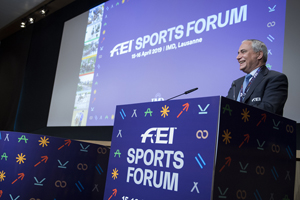 |
FEI Sports Forum 2019 - Monday 15 April Opening & Session 1 - Gender Equality IMD Business School, M100 Auditorium, Lausanne (SUI) |
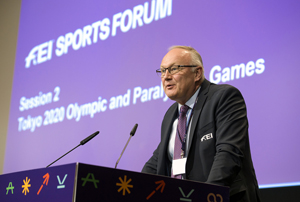 |
FEI Sports Forum 2018 - Monday 15 April Session 2 - Tokyo 2020 Olympic and Paralympic Games IMD Business School, M100 Auditorium, Lausanne (SUI) |
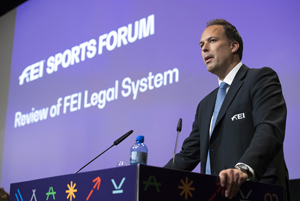 |
FEI Sports Forum 2018 - Monday 15 April Session 3 - Review of FEI Legal System IMD Business School, M100 Auditorium, Lausanne (SUI) |
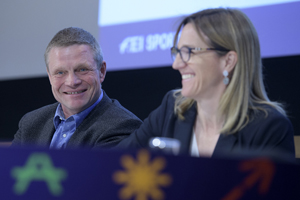 |
FEI Sports Forum 2018 - Monday 15 April Session 4 - Future of Reining IMD Business School, M100 Auditorium, Lausanne (SUI) |
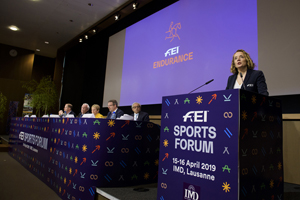 |
FEI Sports Forum 2019 - Tuesday 16 April Session 5 - Endurance - Qualification of Horses and Athletes: Reducing Welfare risks IMD Business School, M100 Auditorium, Lausanne (SUI) |
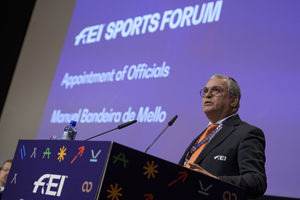 |
FEI Sports Forum 2019- Tuesday 16 April Session 6 - Endurance - Educating Officials and correct application of the rules IMD Business School, M100 Auditorium, Lausanne (SUI) |
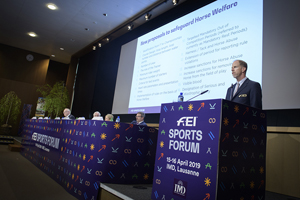 |
FEI Sports Forum 2019 - Tuesday 16 April Session 7 - Endurance - Improvements and innovations to reshape Endurance IMD Business School, M100 Auditorium, Lausanne (SUI) |
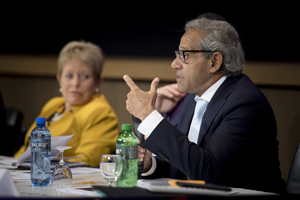 |
FEI Sports Forum 2019- Tuesday 16 April Session 8 - Endurance - Open Q&A and wrap-up by FEI Secretary General IMD Business School, M100 Auditorium, Lausanne (SUI) |
 |
FEI Sports Forum 2019 - Monday 15 April - Official Dinner Royal Savoy Hotel, Lausanne |
 |
FEI Sports Forum 2019 - Tuesday 16 April - Farewell Cocktail FEI Headquarters, Lausanne |
 |
FEI Sports Forum 2018 - Highlights IMD Business School, M100 Auditorium, Lausanne (SUI) |
For its eight edition, the FEI Sports Forum will be held at IMD, in the M100 Auditorium of the Maersk Mc-Kinney Moller Center, Ch. Bellerive 34, 1007 Lausanne.
IMD is an independent business school, with Swiss roots and global reach, expert in developing leaders and transforming organizations to create ongoing impact.
For the last 7 consecutive years, IMD has been ranked TOP 3 in executive education worldwide – FIRST in open programs (Financial Times 2012-2018).
IMD is based in Lausanne, Switzerland and Singapore.
For more information, please visit www.imd.org

For any further information, please contact:
Overall organisation
Sophie Ruiz-Leimer, Senior Corporate Events Manager
Secretary General's Office
sophie.ruiz@fei.org
Logistics, hotels and visas
Julie Schlaefli, Senior Officer, Nominations Committee & Corporate Events
Secretary General's Office
julie.schlaefli@fei.org
| Fédération Equestre Internationale | t | +41 21 210 47 47 |
| HM King Hussein I Building | f | +41 21 310 47 60 |
| Chemin de la Joliette 8 | e | feisportsforum@fei.org |
| 1006 Lausanne, Switzerland | ||
We use cookies on this site to enhance your user experience.
By clicking any link on this page you are giving your consent for us to set cookies.